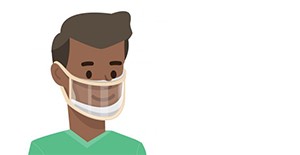Frequently asked questions
If you or your family member are at high risk for severe illness, wear a well-fitted facemask or respirator, such as an N95, KN95/KFN94 or surgical mask (in order of protection), in indoor spaces. Respirators, including N95, KN95 and KF94, or a surgical mask provide greater protection than a cloth face covering. Note: UW employees that voluntarily wear respirators must receive this advisory information. You may also want to speak to your healthcare provider when making these decisions.
UW Human Resources provides information about individual accommodations for individuals at high risk for severe illness. Visit the UWHR website or contact your HR coordinator or AHR business partner.
We understand there are individuals who may not be comfortable with others around them not wearing masks. If this is the case for you, consider wearing a high quality well-fitted facemask or respirator, such as an N95, KN95/KFN94 or surgical mask (in order of protection).
Note: UW personnel who voluntarily wear respirators must receive advisory information.
You can:
- Remind individuals that masks offer another layer of protection to further reduce the risk of transmission.
- When interacting with others in the University community, you can politely ask that others wear a mask; however, they are not required to wear one in a location where face coverings are not required.
Sample language:
- “Wearing a mask indoors when around others is recommended.”
- “I strongly recommend/recommend/encourage/request that you wear a well-fitting, high-quality mask.”
- “Although masks are not required, given our group is large and we will be close together when we meet, I recommend/recommend/encourage/request that you wear a mask.”
Please remember that individuals may wear — or not wear — a mask for a wide range of reasons. Thank you for respecting those needs and choices.
In University locations where a face covering is not required, University personnel and students are not permitted to:
- Require face coverings in your workspace, classroom, meetings, or other settings where it is not required by the University
- Require unmasked individuals to leave your workspace, classroom, or meeting
- Require the wearing of a mask to receive services
- Refuse to perform job duties, including refusing to instruct and/or provide educational services, or other services to individuals who are not wearing a mask
- Make critical statements towards or about people who choose to wear or not wear a mask
Although supervisors and instructors can ask/request/recommend/strongly recommend that masks be worn, they cannot require masks to be worn in the workplace or classroom, unless the workplace or classroom is in an area where masks are required by the UW Face Covering Policy, or in locations or situations where PPE is required (for reasons other than COVID-19 safety).
Supervisors and instructors should be mindful of their position of power when asking individuals to wear masks where it is not required. It is important to be clear when communicating that masks are recommended, not required, and that an individual’s decision to wear a mask (or not) will have no bearing on evaluation of their academic or work performance or working/learning conditions.
1. Choose a well-fitted mask with greater protection than a cloth face covering.
Respirators, including N95, KN95 and KF94, and surgical masks provide greater protection than a cloth face covering. Note: UW employees that voluntarily wear respirators must receive this advisory information.
2. Make sure your mask fits snugly against your face.
Gaps can let air with respiratory droplets leak in and out around the edges of the mask.
- Use toggles or a knotting and tucking technique with medical/surgical masks to ensure a good fit.
- Using a mask fitter or brace over a disposable medical/surgical mask or a cloth mask can help prevent air from leaking around the edges of the mask.
- Check for gaps by cupping your hands around the outside edges of the mask. Make sure no air is flowing from the area near your eyes or from the sides of the mask. If the mask has a good fit, you may be able to see the mask material move in and out with each breath.
